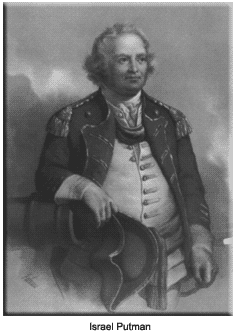 Israel Putnam was born in Salem Village (now Danvers), Massachusetts, the son of a prominent farm family. In 1740, he moved to Pomfret in northeastern Connecticut, where cheaper land was available, and quickly became prosperous.
Putnam put domestic affairs aside during the French and Indian War, serving early with Rogers’ Rangers. He later was captured by Indians, but was spared from being burned at the stake by the last-minute intervention of a French officer.
In 1759, he participated in the attack on Fort Ticonderoga and later at Montreal. In 1762, he survived a shipwreck during a campaign against the Spanish in Havana and later served at Detroit during Pontiac's Rebellion.
Putnam’s postwar life as a farmer and innkeeper exhibited a growing political involvement. He was outspoken against British taxation policies during the Stamp Act Crisis and became active in the Sons of Liberty. During this time, Putnam parlayed his fame as a military hero into a seat in the Connecticut assembly.
According to legend, Putnam left his plow in the field when he received word of the Battle of Lexington and Concord, to offer his services to the Patriot cause. His reputation secured his appointment as one of four major generals to serve under George Washington.
In June 1775, Putnam offered distinguished service at the Battle of Bunker Hill, planned the fortifications for Breed’s Hill and later fought in the battle itself. He progressed to overall command of the American forces in New York until Washington's arrival.
Putnam’s fortunes took a downturn at Long Island, where he was forced to effect a hasty retreat. Washington did not blame Putnam for this failure as some in Congress did. However, Washington reconsidered the talents of his general and assigned him to recruiting activities.
In 1777, Putnam received another, though lesser, military command in the Hudson highlands. He abandoned Forts Montgomery and Clinton, and was brought before a court of inquiry for those actions. However, he was exonerated of any wrongdoing. In December 1779, Putnam suffered a paralyzing stroke, which ended his military service.
In the early days of the war, Putnam was regarded by Washington as one of the Americans’ most valuable military assets, but this view was probably based primarily upon earlier exploits from his colorful past. In the War of Independence, however, Putnam proved to be incapable of commanding complex campaigns, which sharply reduced his value to the cause.
Israel Putnam was born in Salem Village (now Danvers), Massachusetts, the son of a prominent farm family. In 1740, he moved to Pomfret in northeastern Connecticut, where cheaper land was available, and quickly became prosperous.
Putnam put domestic affairs aside during the French and Indian War, serving early with Rogers’ Rangers. He later was captured by Indians, but was spared from being burned at the stake by the last-minute intervention of a French officer.
In 1759, he participated in the attack on Fort Ticonderoga and later at Montreal. In 1762, he survived a shipwreck during a campaign against the Spanish in Havana and later served at Detroit during Pontiac's Rebellion.
Putnam’s postwar life as a farmer and innkeeper exhibited a growing political involvement. He was outspoken against British taxation policies during the Stamp Act Crisis and became active in the Sons of Liberty. During this time, Putnam parlayed his fame as a military hero into a seat in the Connecticut assembly.
According to legend, Putnam left his plow in the field when he received word of the Battle of Lexington and Concord, to offer his services to the Patriot cause. His reputation secured his appointment as one of four major generals to serve under George Washington.
In June 1775, Putnam offered distinguished service at the Battle of Bunker Hill, planned the fortifications for Breed’s Hill and later fought in the battle itself. He progressed to overall command of the American forces in New York until Washington's arrival.
Putnam’s fortunes took a downturn at Long Island, where he was forced to effect a hasty retreat. Washington did not blame Putnam for this failure as some in Congress did. However, Washington reconsidered the talents of his general and assigned him to recruiting activities.
In 1777, Putnam received another, though lesser, military command in the Hudson highlands. He abandoned Forts Montgomery and Clinton, and was brought before a court of inquiry for those actions. However, he was exonerated of any wrongdoing. In December 1779, Putnam suffered a paralyzing stroke, which ended his military service.
In the early days of the war, Putnam was regarded by Washington as one of the Americans’ most valuable military assets, but this view was probably based primarily upon earlier exploits from his colorful past. In the War of Independence, however, Putnam proved to be incapable of commanding complex campaigns, which sharply reduced his value to the cause.